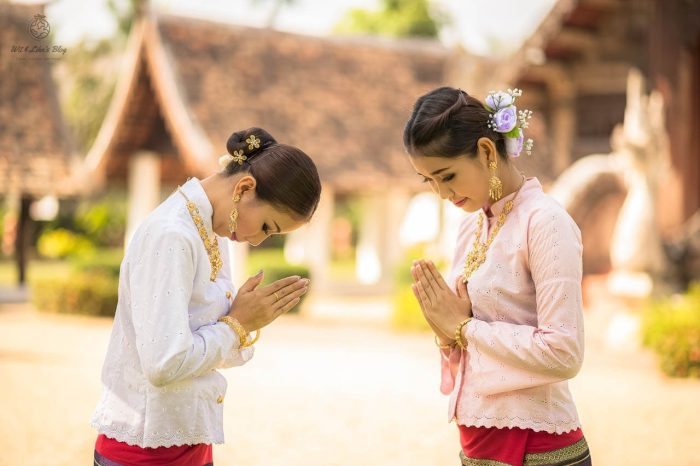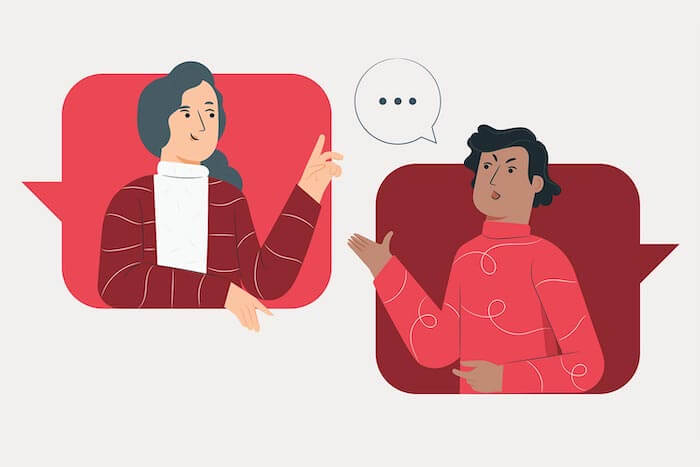29 basic Thai phrases for survival that all travelers/expats should know
Knowing some basic Thai phrases are really helpful whether you are a traveler visiting Thailand or an expat residing in the land of smile. It also helps you to have better interactions with locals and makes your daily life much easier.
You may make mistakes when you first say some Thai words as you need to add tone when you pronounce the words, but don’t lose your effort try to speak to a local Thai as much as you can, you will gradually learn the tone and say the word correctly.
In this post, we would like to show you some basic Thai phrases which will help your travel or residence a lot more simple.

Wai is an action Thai people use when greeting or saying thanks
1. Basic things to know
There are several things regarding how Thai people greet, common honorifics, and their popular pronouns or words you should not overlook.
Wai
Thai people normally use “wai” to greet people or when they say thanks to someone. Wai is the action of putting 2 palms together like when praying and slightly bowing the head. As such, don’t be surprised if someone does the same thing to you when they greet or thank you. You can choose to “wai” when you greet or thank someone, but it is also fine if you don’t “wai” because people don’t mind much about it when you are just a foreigner.
Ka/ Khap honorifics

Ka- woman’s honorific, khap – man’s honorifics
Ka and Khap are 2 honorifics which is popularly used by Thai people to show their respect and politeness to others. These two words are used at the end of the sentences. Ka and Khap have no meaning in English.
Ka is used when you are a woman.
Khap is used when you are a man.
For example, I am a woman, so when I greet someone, I normally say “Sa-was-dee ka”. Instead, my boyfriend will say “Sa-was-dee khap”.
Khun – Ms/Mr/Mrs/You
Khun is a title you normally use to address a person politely. If you add this word before a person’s name, it is similar to Ms, Mr, or Mrs in English. Also, Khun is refer to the pronoun “you” in English as well.
For example,
Khun Linh (femaile): Ms. Linh or Mrs. Linh
Yes/No – Chai/ Mai Chai or Dai/Mai Dai
Both words mentioned above are yes or no, but they are used in different contexts.
Chai/Mai chai: Yes/No to answer when someone asks you if something is right or wrong.
Dai/ Mai dai: Yes/No to answer when someone asks you about your ability to do something.
2. Basic Thai phrases to use in your daily life
Before we start with several basic Thai phrases, don’t forget to add “ka” or “khap” at the end of the phrase. You can arrange the phrase to create a sentence but the order is now the same as an English sentence.
For example: In English, you ask “How much is this dish?”, but in Thai, you say “Jan nee (this dish) ra kha thao rai (how much)”. The word order is not the same as when you question in English.
How much: ra kha thao rai
This dish: Jan nee
Greetings
- Hello: Sa-was-dee
- Thank you: Khob khun
- Sorry/ Excuse me: Khor thot
- No problem: Mai pen rai
- I don’t understand: Mai khao jai
- Goodbye: La Kon / Sa-was-dee
Eating and ordering
- I’m hungry: Hiu
- How much is this? Ra kha (price) thao rai?/ Thao rai
- Not spicy: Mai ped
- No chili: Mai sai prik
- I want it to be very spicy: Ao ped mak mak
- No sugar: Mai sai nam taan
- Takeaway: Ao kub bann
- Delicious: A-roy
Directions
- Turn left: Liew sai
- Turn right: Liew shwa
- Go straight: T-rong pai
- Faster: Rew Rew
- Slower: Cha cha
- Hong nam: toilet
- Where?: Yoo thee nai
Shopping
- This item: Un nee?
- How much: Thao rai
- Can you give me a discount?: Lot oi dai mai?
- A bit: Nit noi
- Do you have different colors?: Mee See Eun mai?
- Do and Don’t things in Thailand
- Thai currency you should know to plan your Thailand trip budget
- Tuk Tuk tips in Thailand
- Bangkok travel guide
- Tips for a great solo journey in Thailand
- Packing list for a great beach vacation in Thailand – What should I pack for a beach vacation
- 29 basic Thai phrases for survival that all travelers/expat should know